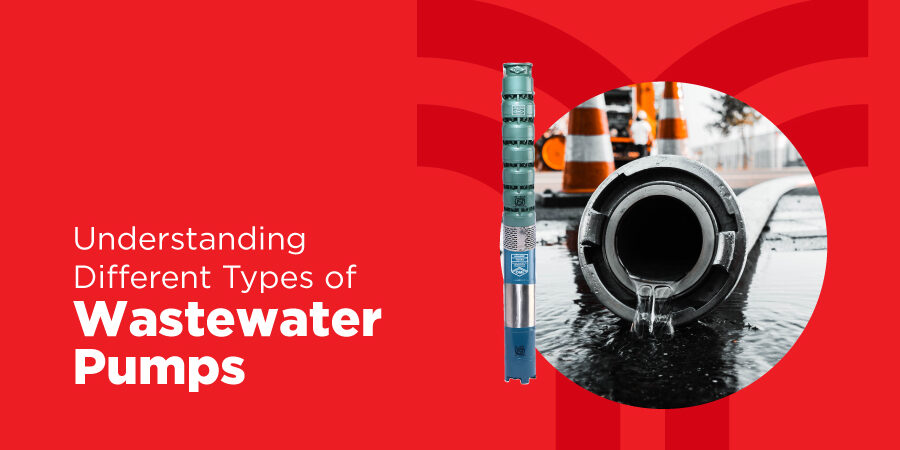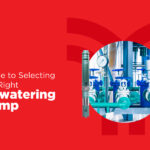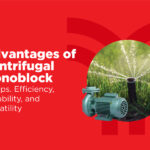Understanding Different Types of Wastewater Pumps: Selecting the Right Pump for Your Needs
Right waste water pump = Elimination of waste + water proper sanitation + environmental protection + public health.
Many aspects can cripple infrastructure and wastewater management is one of them. Modern infrastructure does not risk waste water management. So, they concentrate more on selecting the appropriate pump. For efficient and reliable operation, wastewater pumps come in a variety of designs that suit specific applications and conditions.
Allocating time to understand their types and functions can meet your needs. According to research and markets.com,the waste water pump market is expected to reach 15 billion dollars by 2025. This means that the competition is high and many pump manufacturers in coimbatore will get into the market providing high quality pumps. So, there will be no scarcity and finding quality pumps
In this blog, you can learn about the different types of waste water pumps, their applications and the guide to choose the best one. Read further to explore.
Types of Wastewater Pumps
Typically wastewater pumps are categorised based on the design function and application. Here you can find out some of the most common types.
Submersible Water Pumps
These pumps fully submerge in the wastewater that is being pumped. It perfectly suits applications where space is limited or when the pump needs to operate in flood conditions. these are in high demand to be used in
- Sewage pump systems
- Stormwater drainage
- Industrial wastewater treatment plants.
Centrifugal Wastewater Pumps
These pumps used centrifugal force to propel wastewater through pump casing and into the discharge pipe. This is suitable for applications where large volumes of water need to be moved with relatively low levels of solids. With their high flow rate and efficiency features centrifugal wastewater pumps can deal with large water volumes effortlessly. These are commonly used in,
- Sewage lift stations
- Municipal wastewater treatment plants
- Industrial process water systems.
Positive Displacement Wastewater Pumps
These positive displacement waste water pumps operate by trapping and displacing a fixed volume of wastewater with each pump stroke. They qualify to handle high viscosity fluids and so they are perfect for handling pumping sludges, slurries and abrasive wastewater streams. They are commonly opted in,
- Industrial wastewater treatment
- Chemical Processing
- Oil and gas applications
Air-Powered Wastewater Pumps
Also known as pneumatic pumps use compressors to move the wastewater through the pump chamber. These are used in critical environments that deal with hazardous and explosive items.Electrically powered pumps are not suitable in these environments for obvious reasons. They are used in
- Chemical processing plants
- Refineries
- Mining operations
Sewage Pumps
These are designs specifically for handling raw sewage containing solids (debris and organic matter). These submersible sewage pumps come with features such as a best impeller and cutting mechanism to prevent clogging and damage to the internal pipe areas. These are commonly used in,
- Residential sewage systems
- Commercial sewage systems
- Municipal sewage systems
- Septic tank
- Wastewater treatment applications
Selecting the Right Pump for Your Needs
Below are the factors that explain what you should consider when selecting a waste water pump.
Features of Wastewater
It is important to look up the type and characteristics of waste water. You should know wastewater’s viscosity temperature and chemical composition. This is very important because different pumps handle different types of waste water. Thus, it is essential to choose a pump that is compatible with the characteristics of the waste water.
Flow Rate and Head Requirements
Have clarity in determining the required flow rate and head of your application. The flow rate simply mails the gallons per minute or the litters per second. The head of your application is the vertical distance between the pump and the discharge point. It is very important to be aware of these two features as they determine the flow rate and the performance requirements.
Solids Handling Capability
If your waste water contains solids, debris, sewage and sludge. Choose a pump that can adequately handle solids. Make sure the pump is decided with impellers cutting mechanism and large solid passages to prevent clogging.
Operating Conditions
Be aware where the pump will be installed. You should know the operating conditions and have the correct value of temperature, pressure and the ambient environment. When you are selecting a pump make sure that they are designed with these specific operating conditions. This can ensure reliable performance and durability.
Energy Efficiency
Go with those pumps that are energy efficient. This can reduce the operating cost and mitigate environmental impact. So check for high efficiency motors, variable speed drives, and other energy saving features. This can optimise energy consumption and reduce carbon emissions.
Conclusion
Overall selecting the right waste water pump is important for proper waste water management. You can start with understanding the different types of pumps and their applications. Develop clarity in the characteristics of your wastewater management needs. Choosing the pump that can meet your requirements can assure effective and efficient wastewater management.


